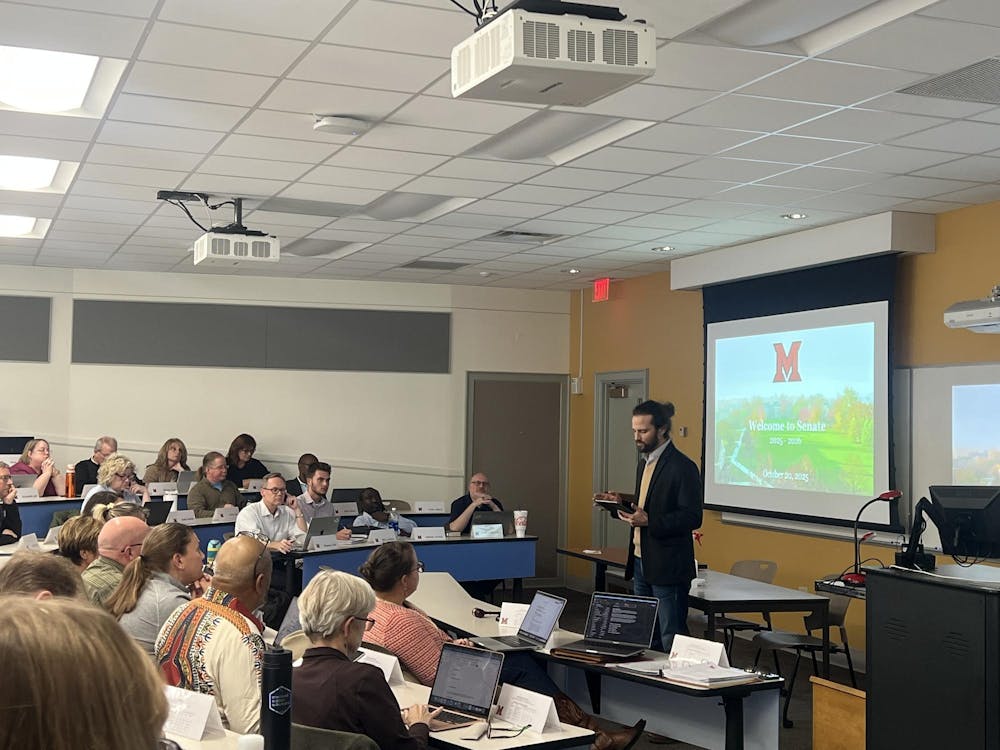On Monday, Provost Chris Makaroff spoke briefly to the University Senate about The Compact for Academic Excellence in Higher Education. This is a Trump administration proposal to United States universities which would confer preferential access to federal funds in exchange for agreeing to certain demands.
“Right now, there is no appetite to even consider joining it, but I will tell you that there was one person that expressed some concern that the state, being the state, might insist that state universities join,” Makaroff said. “The administration is totally against it in every way possible, and probably the only way that it would possibly go through is if somehow or another, they threaten to cut off all funding to the university.”
Makaroff followed up in an email to The Miami Student by saying that Miami was not one of the nine schools asked to sign the compact for Academic Excellence in Higher Education, which is why they have not formally considered it.
Nathan French, vice chair of the senate and chair of the Senate Executive Committee, said he wanted to emphasize collaboration in governance and trust during this school year, following changes in higher education through Senate Bill 1.
“The question of trust is one that this body is navigating each meeting,” French said. “We’ve trusted our colleagues to review our Senate Enabling Act, and in doing so, we operate in trust and faith that the office of provost with the Board of Trustees that our eventual revisions will be welcomed in a sphere of collaboration as we work with them and make a model.”
The senate recently created an ad hoc committee to amend the University Senate Enabling Act in response to new legislation. The senate elected to accept that the proposal be presented at a public hearing during a special meeting of the University Senate on Nov. 3.
Enjoy what you're reading?
Signup for our newsletter
At the previous senate meeting, Darrel Davis, professor and chair of the Department of Educational Psychology (EDP), and Kevin Bush, professor of educational psychology and family science and social work, both spoke on new business regarding a Miami and Cleveland Clinic partnership to prepare graduates to effectively design, implement and evaluate educational programs in healthcare settings.
Davis and Bush said this Master of Education in Health Professions Education (MEHPE) would be aimed at Cleveland Clinic professionals who have educational responsibilities. The University Senate moved to recommend this MEHPE. It also provided reasons and considerations for the Board of Trustees to take into account.
A special report was given by Rachel Beech, vice president of enrollment management and student success, and Duane Drake, senior director of operations enrollment management and student success. They presented a new policy regarding programs of study having a campus affiliation for the sake of federal financial aid. A student’s home campus location and billing will be tied directly to their primary program of study. There will be some exceptions, including nursing students.
Jason Abbitt, professor of EDP and associate dean of the graduate school, gave a report on minimum enrollment for the graduate program. There is a new policy revision hoping to incentivise student progress towards degree completion. It would require one credit hour of enrollment in each term, with exceptions for winter and summer.
Abbitt also proposed a policy revision to limit Graduate Assistantship eligibility to five years. The policy aims to ensure that students complete their degrees within a reasonable time frame and aligns with national practices.
The University Senate's next meeting will be a special hearing at 3:30 p.m. on Nov. 3 in 322 McGuffey Hall.




